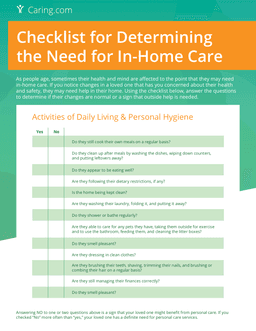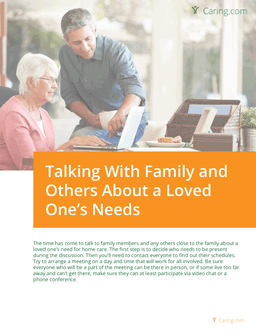
219 North Port Hill Dr , Florissant, MO, 63033
Pricing not available
Caring.com offers a free service to help families find senior care and authentic reviews to help you in...
Sort By

219 North Port Hill Dr , Florissant, MO, 63033
Pricing not available

8790 Manchester Road Suite 205C , Saint Louis, MO, 63114
Pricing not available
Caring's Family Advisors are here to help you with questions about senior living and care options.
Home care costs in Overland are comparable to the national average of $4,481, according to Genworth’s 2020 Cost of Care Survey. Both are $109 more than the state average. The cost of home care in Overland is variable depending on where an individual lives, how many hours of care are needed and what types of services need to be provided. St. Joseph residents pay $4,338, while those in Springfield pay $4,290. Columbia is one of the most expensive cities with costs of $4,576.
Overland
$4,481
Missouri
$4,372
United States
$4,481
St. Joseph
$4,338
Columbia
$4,576
Springfield
$4,290
If cost is an issue, it’s important to consider all the available options for long-term care. Home care and home health are both the same cost at $4,481 per month in Overland. Adult day health care is the cheapest option, at $1,842, and is ideal for seniors who live with family or have assistance at night. Assisted living costs $3,750, and a semiprivate room in a nursing home is $5,355 per month.
Home Care
$4,481
Home Health Care
$4,481
Adult Day Health Care
$1,842
Assisted Living
$3,750
Nursing Home Care (semiprivate room)
$5,355
Note: Data for Overland was unavailable, so data for the nearest city, St. Louis, was used instead.
Given the high cost of in-home care, many people use one or more forms of financial assistance to cover the expenses. Below, we explain some of the most common sources of financial help for paying for in-home care. If none of these options are available to you, you can reach out to your Area Agency on Aging or Aging and Disability Resource Center to learn about local resources.
Long-Term Care Insurance: Long-Term Care Insurance covers expenses related to senior care, including in-home care. Depending on the policy type, beneficiaries may receive a cash payment to use towards long-term care or reimbursement for qualifying long-term care expenses. Note that there are limitations- typically a maximum benefit of $150 per day- and exact coverage terms vary depending on the exact policy, so always check the details.Medicare: Medicare does not cover in-home care because it is classified as custodial, or non-medical, care. However, some Medicare Advantage and Medicare Supplement plans, which offer expanded benefits, may cover in-home custodial care.Medicaid: Medicaid coverage of in-home care varies between different states because it is not a federally mandated benefit. Currently, all states cover some in-home care either through their standard Medicaid or a waiver program. The specific coverage rules are set individually by each state.Veterans’ Benefits: The Aid and Attendance benefit is a monthly cash payment that beneficiaries can use to pay for senior care, including in-home care services. To qualify for A&A, Veterans must already receive the VA pension and meet several additional requirements, including needing assistance with the activities of daily living.Contact the Department of Veterans Affairs to learn more.Reverse Mortgages: Home Equity Conversion Mortgages (HECMs) are federally insured loans that are available to homeowners age 62 and over. Reverse mortgages allow you to access a portion of your home’s equity in cash, tax free. Many seniors use reverse mortgages to finance their care expenses, including in-home care. Note that although there are no monthly payments due on reverse mortgage loans, borrowers do have to repay the loan once the last surviving homeowner passes away, moves, or sells the home.
Seniors who need help maintaining their homes and aging in place have access to many different options for assistance in Overland. This list provides an array of services, both free and low-cost, that help address these needs.
| Resource | Contact | Service |
|---|---|---|
| County Older Resident Program | (314) 615-4516 | The County Older Resident Program (CORP) helps seniors aged 60 and older address their needs through a variety of programs and services. These services include transportation, home visits and telephone reassurance, home care and repair, tax preparation, claims assistance, volunteer opportunities and information and referrals. |
| St. Louis Area Agency on Aging | (314) 612-5918 | The St. Louis Area Agency on Aging (SLAAA) provides community-based services for older adults in the area. The goal of the agency is to help seniors stay in their homes for as long as possible by providing employment, volunteer opportunities and social activities. Other programs offered to seniors include tax assistance, disease prevention education, transportation and insurance counseling. |
| Frank Munsch Community Center | (314) 428-0490 | The Frank Munsch Community Center offers activities and programs to keep seniors busy and safe during the day. The community center has a weight room and cardio room, two full-sized gymnasiums, an elevated walking track, a racquetball court, a sauna and several multipurpose rooms for classes and activities. |
| Utility Assistance | (866) 674-6327 | The Utility Assistance Program helps connect seniors aged 60 and older with organizations that can help them pay their energy bills, especially during the winter months or when they are faced with disconnection. These organizations include Dollar Help, Heat UP St. Louis and Energy Care. |
| Community Action Agency of St. Louis County Weatherization Assistance Program | (314) 863-0015 | The Weatherization Assistance Program helps seniors reduce their monthly energy bills by implementing energy-efficient measures, including installing insulation, repairing or replacing old and worn heating systems and replacing air filters. |
Aging can be a difficult process, and loved ones may not always ask for help – often times it’s up to their family to evaluate their need for help around the house. While no two situations are exactly alike, this checklist can help you and your loved ones determine when it’s time to start the search for a home care provider.


If you’ve determined that your loved one needs the assistance of a care provider in their home, it may be time for a difficult conversation. Handled correctly, however, this process can bring a family together and ensure that everyone’s concerns are addressed. Use this PDF as a starting point to help the conversation stay as positive and productive as possible.

